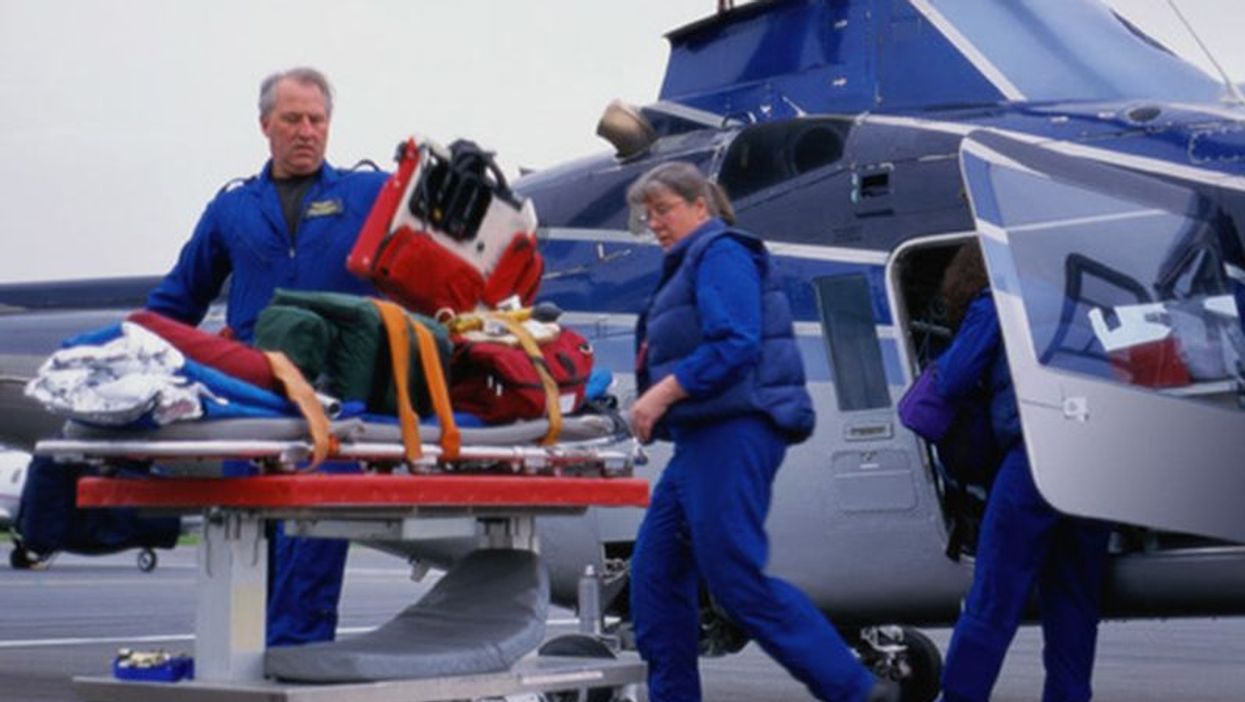Working in the field of air ambulance services can be incredibly rewarding, knowing that you are saving lives and providing crucial medical care to those in need. However, it’s important to acknowledge the emotional toll that this line of work can take on healthcare professionals. The high-pressure environment, witnessing traumatic events, and dealing with life and death decisions can leave a lasting impact on the mental wellbeing of air ambulance workers. In this article, we will explore the emotional challenges faced by these dedicated individuals and discuss strategies for coping and finding support.

Understanding the Emotional Toll Air Ambulance Workers Face
Air ambulance workers perform a critical and heroic role in our healthcare system, often operating under high-pressure situations where every second counts. However, it is important to recognize and understand the emotional toll that comes with this line of work. Air ambulance professionals are at a higher risk of experiencing emotional burnout and compassion fatigue due to the unique challenges they face on a daily basis. In this article, we will explore the various aspects of the emotional toll air ambulance workers face and how they can manage the stress and maintain their emotional well-being.
Risking Emotional Burnout and Compassion Fatigue
Air ambulance workers are exposed to traumatic and intense situations as they respond to emergencies and transport patients. Witnessing life-threatening situations, coping with the loss of patients, and encountering human suffering can take a significant toll on their emotional well-being. This prolonged exposure to highly stressful situations can lead to emotional burnout and compassion fatigue. Emotional burnout refers to a state of physical, emotional, and mental exhaustion caused by excessive and prolonged stress. Compassion fatigue, on the other hand, occurs when individuals become emotionally drained and disengaged due to constantly caring for others.
The Unique Challenges of Air Ambulance Work
Air ambulance work presents its own set of challenges that contribute to the emotional toll on workers. They often have to make split-second decisions in high-stress situations, dealing with limited resources and unpredictable conditions. The constant exposure to life and death situations, coupled with the pressure to provide the best possible care, can cause significant emotional strain. Additionally, the irregular work schedules, long hours, and time away from family and loved ones can further add to the emotional burden.
Managing Stress and Emotional Well-being
Recognizing and managing the emotional toll is crucial for the overall well-being of air ambulance workers. By implementing effective strategies, they can reduce the risk of burnout, promote resilience, and maintain good mental health. Let’s explore some ways in which air ambulance workers can take care of their emotional well-being.
Recognizing Signs of Emotional Distress
Identifying Symptoms of Emotional Distress
It is important for air ambulance workers to be aware of the signs of emotional distress, both in themselves and their colleagues. Emotional distress can manifest in various ways, including feelings of overwhelming sadness or hopelessness, irritability, anxiety, insomnia, and loss of interest in activities once enjoyed. Physical symptoms such as headaches, stomachaches, and fatigue may also be present. Recognizing these symptoms early on can help in addressing emotional distress before it worsens.
Prevention and Early Intervention
Prevention and early intervention play a crucial role in managing emotional distress among air ambulance workers. By implementing stress management techniques, such as regular exercise, engaging in hobbies, and maintaining a healthy work-life balance, individuals can reduce the risk of emotional burnout. Creating a supportive and non-judgmental work environment, where open communication is encouraged, can also contribute to early identification and intervention.
Seeking Professional Help
Sometimes, the emotional toll may be too much to handle alone, and seeking professional help can be beneficial. Air ambulance workers should feel comfortable reaching out to mental health professionals who specialize in trauma and stress management. Confidential counseling sessions can provide a safe space for individuals to process their emotions and develop effective coping strategies.

Coping Strategies for Air Ambulance Workers
Emotional Self-Care
Emotional self-care is crucial for air ambulance workers to maintain their emotional well-being. This involves engaging in activities that promote relaxation and emotional healing. Some effective self-care practices include mindfulness and meditation, journaling, spending time in nature, and connecting with loved ones. By prioritizing self-care, air ambulance workers can recharge and replenish their emotional reserves.
Creating a Supportive Work Environment
A supportive work environment plays a significant role in mitigating the emotional toll on air ambulance workers. Employers should prioritize the well-being of their employees by fostering a culture of support and understanding. This can include providing regular check-ins, promoting work-life balance, and ensuring that adequate staffing levels are maintained to prevent excessive workload and burnout.
Peer Support and Debriefing Sessions
Peer support and debriefing sessions are valuable resources for air ambulance workers to process their experiences and emotions. These sessions provide a platform for colleagues to share their thoughts, concerns, and challenges, fostering a sense of camaraderie and understanding. By engaging in discussions and seeking support from peers who have experienced similar situations, air ambulance workers can find solace and gain valuable insights.
Building Resilience and Mental Well-being
Enhancing Resilience Resources
Building resilience is an essential component in maintaining mental well-being for air ambulance workers. Resilience involves the ability to bounce back from challenging or traumatic experiences and adapt in the face of adversity. To enhance resilience, individuals can engage in resilience-building activities such as positive self-talk, cognitive reframing, and practicing gratitude. Developing a growth mindset and seeking opportunities for professional development can also contribute to building resilience.
Promoting Positive Mental Health
Promoting positive mental health among air ambulance workers is paramount. This can be achieved through awareness campaigns, education, and destigmatizing conversations surrounding mental health. Employers should provide resources and support, such as access to mental health professionals, to ensure that workers have the tools they need to maintain and improve their mental well-being.
Balancing Work and Personal Life
Finding a healthy balance between work and personal life is essential for the emotional well-being of air ambulance workers. Setting boundaries, both at work and at home, can help in maintaining a sense of control and prevent work-related stress from spilling into personal life. Prioritizing self-care and engaging in activities outside of work can provide the necessary rejuvenation and help create a sense of fulfillment.
Support Systems for Air Ambulance Workers
Counseling and Therapy Services
Counseling and therapy services are a valuable support system for air ambulance workers. Mental health professionals who specialize in trauma and stress management can provide individuals with a safe space to address their emotions, process trauma, and develop effective coping strategies. These services should be easily accessible to all air ambulance workers, without any stigma or barriers.
Employee Assistance Programs
Employee Assistance Programs (EAPs) are another important resource available to air ambulance workers. EAPs offer confidential counseling and support services to employees and their families. These programs often provide assistance for a wide range of concerns, including mental health, financial issues, and relationship difficulties. By utilizing EAPs, air ambulance workers can access resources and support that can alleviate emotional distress and improve overall well-being.
Mental Health Awareness Training
Employers should prioritize mental health awareness training for all air ambulance workers. This training can help individuals recognize signs of emotional distress in themselves and their colleagues, provide them with the knowledge to support and refer individuals for professional help when needed, and reduce stigma surrounding mental health. By equipping workers with the necessary tools and knowledge, organizations can create a more supportive and understanding work environment.
Resources for Air Ambulance Workers
Books and Literature on Trauma and Self-Care
Books and literature on trauma and self-care can be valuable resources for air ambulance workers seeking to enhance their understanding of the emotional toll and learn effective coping strategies. These resources provide insights, guidance, and practical exercises that can aid in processing emotions and promoting self-care. Some recommended books include “The Body Keeps the Score” by Bessel van der Kolk and “Trauma Stewardship” by Laura van Dernoot Lipsky.
Online Support Groups and Forums
Online support groups and forums provide a platform for air ambulance workers to connect with others who share similar experiences. These communities offer a space for individuals to share their thoughts, seek advice, and provide support to one another. Being part of an online support group can help alleviate feelings of isolation and provide a sense of community.
Wellness Retreats and Workshops
Participating in wellness retreats and workshops can be a rejuvenating experience for air ambulance workers. These events often provide opportunities for individuals to engage in self-care practices, learn about stress management techniques, and connect with others who understand the unique challenges of air ambulance work. Wellness retreats and workshops can serve as a much-needed break from the demands of the job and contribute to overall emotional well-being.
The Role of Organization in Providing Support
Organizational Responsibility for Employee Well-being
Organizations that employ air ambulance workers have a crucial role in supporting their employees’ emotional well-being. It is the responsibility of these organizations to create policies and procedures that prioritize the mental health of their employees. This includes implementing adequate staffing levels, providing access to counseling services, and encouraging a supportive work environment.
Creating a Culture of Support
Creating a culture of support within organizations is essential to mitigating the emotional toll on air ambulance workers. Employers should encourage open communication and foster a non-judgmental environment where individuals feel safe and supported in discussing their emotions and seeking help. By valuing and prioritizing mental well-being, organizations can effectively reduce the emotional burden on their employees.
Access to Adequate Resources
Organizations should ensure that air ambulance workers have access to adequate resources to address their emotional well-being. This includes providing sufficient staffing levels, ensuring regular debriefing sessions, and facilitating access to counseling and therapy services. By having these resources readily available, organizations can support their employees effectively and promote a healthier work environment.
The Importance of Peer Support and Teamwork
Strength of Peer Relationships
Peer support plays a vital role in the emotional well-being of air ambulance workers. The understanding and camaraderie among colleagues who have shared experiences can be a source of comfort and resilience. Building strong peer relationships allows individuals to lean on each other for support, share coping strategies, and foster a sense of community.
Encouraging Open Communication
Creating a work environment that encourages open communication is crucial for air ambulance workers to address their emotional well-being. Organizations should facilitate regular debriefing sessions where individuals can openly share their experiences, concerns, and emotions. By providing a safe space for individuals to express themselves, organizations can promote emotional healing and prevent feelings of isolation.
Supportive Team Dynamics
Supportive team dynamics are essential for the emotional well-being of air ambulance workers. Teams that function effectively, trust each other, and share the workload can contribute to reducing stress and fostering a positive work environment. By promoting teamwork, organizations can enhance the emotional well-being of their employees and ensure the best possible care for patients.
Recognizing and Addressing Stigma Surrounding Mental Health
Reducing Stigma and Breaking Silence
Stigma surrounding mental health is a significant barrier to seeking help and support. Organizations should actively work to reduce stigma by fostering a culture of open dialogue and understanding. This can be achieved through awareness campaigns, education, and destigmatizing conversations surrounding mental health. By breaking the silence, organizations can create an environment where individuals feel comfortable seeking help without fear of judgment or reprisal.
Educating and Raising Awareness
Educating air ambulance workers about mental health and its impact is crucial. Organizations should provide mental health awareness training to increase understanding, recognize signs of emotional distress, and promote self-care. By providing education and raising awareness, organizations can empower their employees to take care of their emotional well-being and seek support when needed.
Creating a Safe Environment
Organizations play a vital role in creating a safe environment for air ambulance workers to discuss their mental health. This involves implementing policies and procedures that protect confidentiality and ensure that individuals feel safe and supported in seeking help. By taking proactive measures to create a safe environment, organizations can break down barriers to seeking support and promote emotional well-being.
Conclusion
Air ambulance work is emotionally demanding and can take a toll on the well-being of workers. Understanding the unique challenges they face and providing appropriate support is crucial in mitigating the emotional burden. By recognizing signs of emotional distress, implementing effective coping strategies, and creating a supportive work environment, air ambulance workers can maintain their emotional well-being and continue to provide exceptional care to those in need. It is the collective responsibility of organizations, colleagues, and the broader community to prioritize the emotional well-being of air ambulance workers and ensure they have the necessary support and resources to thrive in their vital role.




